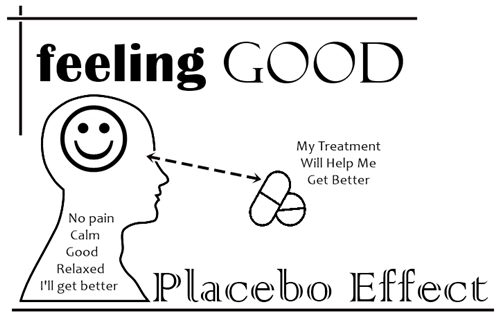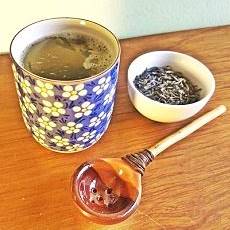Studying the Placebo Effect
How do placebos work?
How placebos work is still not quite understood. It certainly involves the brain and its feel-good chemicals such as dopamine and endorphins. It also activates certain parts of the brain linked to mood, self-awareness and emotional reactions. The brain through complex neural and chemical channels tells the body it should feel better.
Of course a placebo effect won't cure cancer, mend a broken bone or reduce cholesterol, but it can act on certain symptoms such as pain and bring relief. The placebo effect will make the patient feel better.
The National Institutes of Health (NIH) has supported research to explore the placebo effect and there are some interesting avenues for future research, such as the possible genetic markers that could help predict if someone will respond to a placebo, the unconscious mechanisms involved in the effect and the surprising notion that "placebos may be helpful even if the patients know the're receiving placebos" (4).
The Genetic component in placebo reaction
Hall, Loscalzo and Kaptchuk (2015) have concluded that (4):
- Predisposition to respond to placebo treatment could have a genetic cause.
- Placebo responses may not only influence the "placebo" arm of a clinical trial (the control group), it may also modify the outcome of the drug treatmen arm (the group receiving the real medicine).
- The placebo effect acts upon neurochemical pathways, such as dopamine and opioid functions, and probably upon endocannabinoid and serotonin pathways. These are chemicals that influence act on learning, reward, motivation, depression, appetite, pain sensation and analgesia, mood. They don't act upon the pathology.
The evidence is interesting: rs4680 is a gene snippet that regulates the production of an enzyme called catechol-O-methyltransferase (COMT). This enzyme is one of many that act on a group of brain chemicals called catecholamines, that includes dopamine and epinephrine.
As rs4860 can affect dopamine levels, it has an indirect effect on the placebo effect.
A small mutation in rs4680 can reduce COMT's enzymatic effect to one third or one quarter of the normal values, lowering dopamine levels and therefore increasing pain sensitivity.
The mutation is quite common and found in 1 in 2 Caucasians and 1 in 3 East Asians.
Since conditions related to chronic stress are more susceptible to placebo effects, this mutation may influence clinical trials studying those conditions such as heart disease, and irritable bowel syndrome (IBS).
The individuals witht the mutation experienced the strongest placebo response while the non-mutated group were the least influenced by the placebo treatment.
Patient-Doctor interaction
Warm, caring physicians that interact empathically with their patients have a positive enhancing effect on healing. Hall et al., (2012) found that this type of empathy brings improvement and healing benefit to the group with the mutation mentioned further up, who by the way, are also individuals with "increased sensitivity to experimental and chronic pain relative to [the non mutated] individuals."
However, the non-mutated patients were less influenced by the placebo treatment, regardless of whether it is delivered in an augmented or limited context (5).
Furthermore there is speculation that subtle cues that the clinician conveys to the patient could be perceived without conscious awareness and have an impact on the placebo effect (6).
Expectations and Conditioning
Classic conditioning is a learning association formed between stimulus and response, this is remembered and a behavior acquired, for instance if a patient experiences a reduction in pain after taking a placebo pill that looks like the real one, in the future when taking the pill, it will provoke the same conditioned behavior.
Expectations shaped by verbal cues received by the patient may influence the patient. The physician telling the patient that the placebo is effective as an analgesic will elicit this pain-killing response in the subject. The environment and bond between patient and doctor, the patient's condition and state of mind also influence this outcome (7).
Conditions Sensitive to Placebo Effect
Some medical conditions are more susceptible to the placebo effect than others. Some of the ones more sensitive to this effect are: Migraines, joint pain, arthritis, asthma, high blood pressure, and depression.
Nocebo
The "nocebo" effect is where a placebo produces a negative effect, such as dizzyness, nausea, pain. And this is caused by negative expectations. The word comes from Latin (nocere) and it means "harm"
.
The nocebo effect can be triggered when a patient is told the adverse side effects they may experience before starting treatment. So the nocebo effect is something that should be minimized when designing trials.
Getting Well even when you know you are taking a Placebo
Lembo et al. (2021) (7) conducted an "open-label" trial where the placebos were not concealed.
The patients received the placebo labeld as such and knew they were getting the dummy medicine. The trial was to test treatment for irritable bowel syndrome (IBS).
They found that patients receiving open-label placebo (OLP) reported "significantly better ... in improving IBS symptoms" than those reciving the usual treatment.
The physicians interacting with the participants during the trial were instructed what to do in the event that they expressed doubts about the OLP. They were to be validated in their suspicion "by discussing their own puzzlement and reflected on the unique design of this trial. Participants were encouraged to keep an open mind and 'see what happens'."
Closing Comments
The human mind has an incredible versatility, the brain perceives the environment, takes subtle unconscious cues from it and from the physician, and acts even though the subject is unaware of these perceptions.
The interaction with the treatment and the phyisician also elicits conditioning and expectations in the patient about the outcome. Which can also be a nocebo effect, a negative one.
The genetic makeup of the subject also influences the placebo effect through complex neorochemical interactions on pain, mood, depression and cognition.
The remarkable point is that even knowing that he or she is receiving a placebo, the treatment works, even better than the regular therapy in some conditions like irritable bowel syndrome (IBS).
Ongoing research will help to design better clinical trials, and also how to use this placebo effect to relieve pain and suffering in patients.



